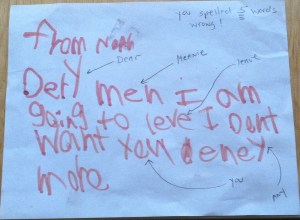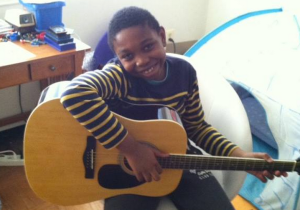As my 11-year old son prepared for his first day as a sixth grader, I had begun to think about what I’ve done as a parent to get him to this stage. Though I’m not a fan of sports metaphors, I can’t help but think of my parental ups and downs as home runs, doubles, foul balls or woeful strike outs. Luckily I’ve had more successes than failures.
There have been prospective, new and overwhelmed parents who have asked me for general parental advice, like how to handle situation X or prevent incident Y from happening again.
I never attempt to pass myself off as a child psychologist or a licensed counselor when giving advice. Furthermore, I don’t pretend to be the Martha Stewart of parenting and have found those who act as such arrogant and pretentious. I always listen closely before I dole out advice nor do I take umbrage if it’s not followed.
Though my journey as a parent is not complete, there are rules that I have discovered and followed that have served me well, which I’ve passed on to others.
So here are my ‘Top 10’ Parenting Tips that have helped make my preteen son a responsible, observant and thoughtful individual (when he’s not driving me semi-bonkers by bouncing between ages 7-17 without giving me prior notice):
1. Make sure your child knows he/she will face consequences for their actions, no exceptions. If your child figures out that you’re what I define as a ‘serial warner’ (i.e. someone who gives their child constant and repetitive warnings with little or no follow through on their ‘threats’) then you’re setting yourself up to be challenged by your child regarding every request or demand you make of them. The last time I’ve had a major challenge from my son was when he was 5 years old. He was giving me a lot of backtalk because he thought it was funny. I wasn’t sure if the backtalk was just a phase or something that would become a bad habit, therefore I decided to play things by ear. Unfortunately, it only got worse, which is when I threw down the hammer. I told him that if he did it one more time I was going to take away all his toys for a week. He didn’t believe me so he ended up watching me bag up all of his toys and remove them from his room. Afterwards I taped a calendar to his door with a big ‘X’ over every day he would be without his toys. He was stunned. Sometimes he would sit on his bed and just stare at his empty floor. When the seven days were up I returned his toys without saying a word. Drastic? Yes. Successful? Most definitely. He finally learned what consequences meant and that I meant what I said, which improved our relationship significantly.
2. Show respect for the body and its bodily functions. I cringe whenever I hear parents and their kids use cute nicknames for body parts such as calling a penis a ‘wee wee’ or a vagina ‘little girl parts.’ How are you going to teach your child to respect their body and the bodies of others if you mystify it so much that they inadvertently don’t value its importance? I’m not saying that you should use the word ‘excrement’ or ‘sh*t’ instead of ‘taking number two.’ However, using proper names for body parts, explaining how they work and the similarities and differences between the male and female anatomy will go a long way in helping your child understand proper and improper body boundaries and most importantly his/her sexuality when the time comes.
3. Don’t run from questions because you feel that your child isn’t ready for the answer or you didn’t see it coming. Most of the times it seems parents are the ones who don’t want to deal with a question. I ended up having my first serious talk about sexuality with my son when he was eight-years old. I was watching a Boondocks episode when two male rappers/characters on the show admitted they were attracted to each other and started kissing. My son happened to walk in on the episode and asked ‘Why are those guys kissing?’ I could’ve said something to the effect of ‘I’ll talk to you later about it’ or ‘you’re too young right now for that conversation’ but I didn’t. I somehow knew that this ‘talk’ was going to happen now so I answered his question, which led to other questions and discussions about heterosexuality, homosexuality, bisexuality and transgender relations. As a result he is receptive to all forms of expressed affection and to those who are part of the LGBT community. Most importantly, my son realized that he could ask me anything without being prejudged or shutdown. I’m not advocating that all parents should be as forthcoming because obviously each child’s emotional maturity is different. However, before you go into deflect mode on topic X make sure you feel it’s necessary and not because you simply don’t want to deal with the topic yet. Remember – it’s not about you – it’s about your child.
4. Know when to hold ‘em, know when to fold ‘em. This lyric from Kenny Rogers’ The Gambler’ song is also apropos when dealing with your child. You have to figure out what battles are worth fighting. Are you trying to teach your child a lesson or are you just standing your ground to prove you’re the one in charge? For example, when my son hit fourth grade we used to battle over what he would wear to school. I would try to make sure that he went through most of his wardrobe so that he wasn’t wearing the same combinations all the time or clothing combo nightmares. We locked horns regularly which started to drive my husband up a wall. I eventually realized that by forcing my son to wear what I picked out put us both in a bad mood. We eventually came to a compromise where he could pick out what he wanted, but if his mom and dad didn’t like his wardrobe selection he had to change. In this instance, my decision to ‘fold’ made things better for mom, dad and son. As a parent you will find yourself having to re-learn this lesson with your child so don’t be surprised that you will be traveling this road again several more times.
5. Sometimes you have to let your child struggle in order for them to learn how to accomplish things on their own. As a parent you want to help your child at all times, especially when they’re young. But at some point you have to let them figure things out on their own, even when they’re not successful at it (ideally without allowing it to turn into a meltdown). Whether it’s looking up a word in a dictionary; opening a container or getting dressed. It’ll teach them to keep trying instead of immediately running to you or others for help.
6. Don’t overschedule your child with activities. We all want to keep our kids active so that they remain physically and emotionally healthy and hopefully have a good time. But think about the many things your child does on a regular basis: school, homework, childcare, extracurricular activities, hanging out with family and friends, tutoring, afterschool clubs and much more. Your child has a very busy life. But just like adults, kids need downtime as well. Don’t look at it from the viewpoint of you being a bad parent for allowing your child to occasionally to sleep in late on weekends, chill out in his/her room or watch television zonked in the family room. Look at it as allowing them time to rest, which they will always need.

7. It’s not too early to assign chores/responsibilities to your child. By the time I was twelve I was assigned several chores, including cleaning the bathroom. I’m not one of those old-school parents where I think today’s children are completely infantilized. However, I do think that parents are waiting too late to assign their kids regular chores to do. As a result, their child doesn’t handle responsibilities well – or worse, you end up doing it yourself. Just start small such as having them cleaning their room, helping to unload/reload the dishwasher, putting their dirty clothes in the laundry bin, taking out the garbage or placing dishes in the sink after dinner. This will get them in the habit of doing things for themselves without prompting from their parent(s).
8. Sleepovers and playdates are great for children and parents. When you have your child’s friend over for a playdate/hangout or sleepover it’s a win-win for the child and the parent. Your child has someone to play with, and it gives you time to do other things. If your child goes over to someone else’s home then you have that much needed quiet time for yourself or with your significant other. Therefore strive hard to connect with the family of your child’s close friend(s) so that you both get in the habit of having hangouts and sleepovers at each other’s homes. Besides it being a good idea for your child’s social and emotional development, it will save you a lot of money on babysitters.
9. Do your best not to fall into ‘assigned’ parenting roles. This is sometimes hard to do. Depending on the set-up of how your family works (i.e. single parent, working parent with stay-at-home parent), this can dictate the parental dynamics of how you interact with your child. Nevertheless, don’t allow how you interact with your child to be determined by your gender, your preferred interests or disciplinary ideology. You don’t want to be viewed as the no-fun, no playtime, always-make-me-do-stuff-I-don’t-want-to-do or ‘drill sergeant’ parent. Mix-up your roles from time to time; do things that you don’t normally do with your child so that he/she sees you in different a light. For example, if you’re the ‘homework parent,’ maybe next time when you go to the park you should seriously hit the jungle gym with your kid. If you’re the ‘basketball coach,’ take a detour and hang out at the library with your kid on occasion. Going outside the box a bit will bring more parental balance in a two-parent household. And for single parents, your child will be more aware and hopefully appreciative of the many hats that you can and do wear.
10. Don’t inadvertently put them in a bubble in your effort to protect them from what’s happening in the world. As a parent you don’t want your child to experience any bad feelings (i.e fear, hurt, pain, embarrassment, etc.) until they’re able to handle them. But sometimes things don’t work out that way, so you have to prepare them to handle these emotions when that time comes. My husband and I have had talks with our son about life and death; we’ve also talked to him about racism/racial bias, driving while black, and police brutality because we know that it may be just a matter of time when he will have to deal with these issues as an African-American male. He has seen videos, news, movies and documentaries about the black experience in America (Roots, Fruitvale Station, Central Park Five case, civil rights movement, death of Eric Garner and Trayvon Martin, etc.) to help him understand his history better. If I had a daughter I would’ve added gender bias to the conversation as well. Kids need to know that the world isn’t always so wonderful, which is possible to do without scarring them. Start slowly by picking a movie or program for you to watch together and make sure to allot time afterwards to discuss it with them, to answer any questions they may have. It’ll be a teachable, bonding moment for both of you.
Not all children are alike so don’t push them down a path that they’re not ready to take. However, don’t hold them back just because you’re not ready to take that journey with them. Yes, the advice sounds simple, but following through on it will be hard. You must always keep in mind that your job as a parent is to help your child grow so that he/she is eventually able to take care of themselves.
Anything less than that then you’re not doing the one job you should be doing as a parent.
…………………………………………………..
Suggested Parent Resources:
Mr Nussbaum: A wonderful website has extensive reading, math, social studies and science tools for grades K-8 that are fun and challenging. Lessons can be done individually by the child or in concert with a parent.
Khan Academy: If you find yourself flummoxed by math, science, history or any other academic questions that your child asks you this is the site for both of you. It’s a free site full of straight-forward information (standard videos, interactive videos, etc.) for students, parents, teachers or anyone who wants to learn.
Library of Congress: Their ‘Kids and Families’ page is chockfull of online information on books, history, geography, music and much more.
Scholastic’s Parent and Child’s 100 Greatest Books: List contains classics and other well-known books grouped by age and genres.
50 Multicultural Books Every Child Should Know: Books for ages preschool to twelve that have main characters who are people of color.
YouTube: A great place to see and hear music (full albums, videos, etc.) which you can share with your child. A lot of the music downloads have lyrics to them to aid in any sing-along efforts. It’s a fun, easy and informative way to spend time with your child while sharing and learning about a wide variety of music genres.
Common Sense Media Best Documentaries: Good list of documentaries that are educational, uplifting, serious and funny and can be viewed by the entire family.
PBS American Experience: Great learning tool for kids in that its documentaries are straightforward and handle sensitive material in an appropriate manner.

